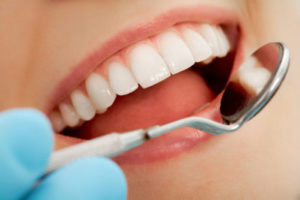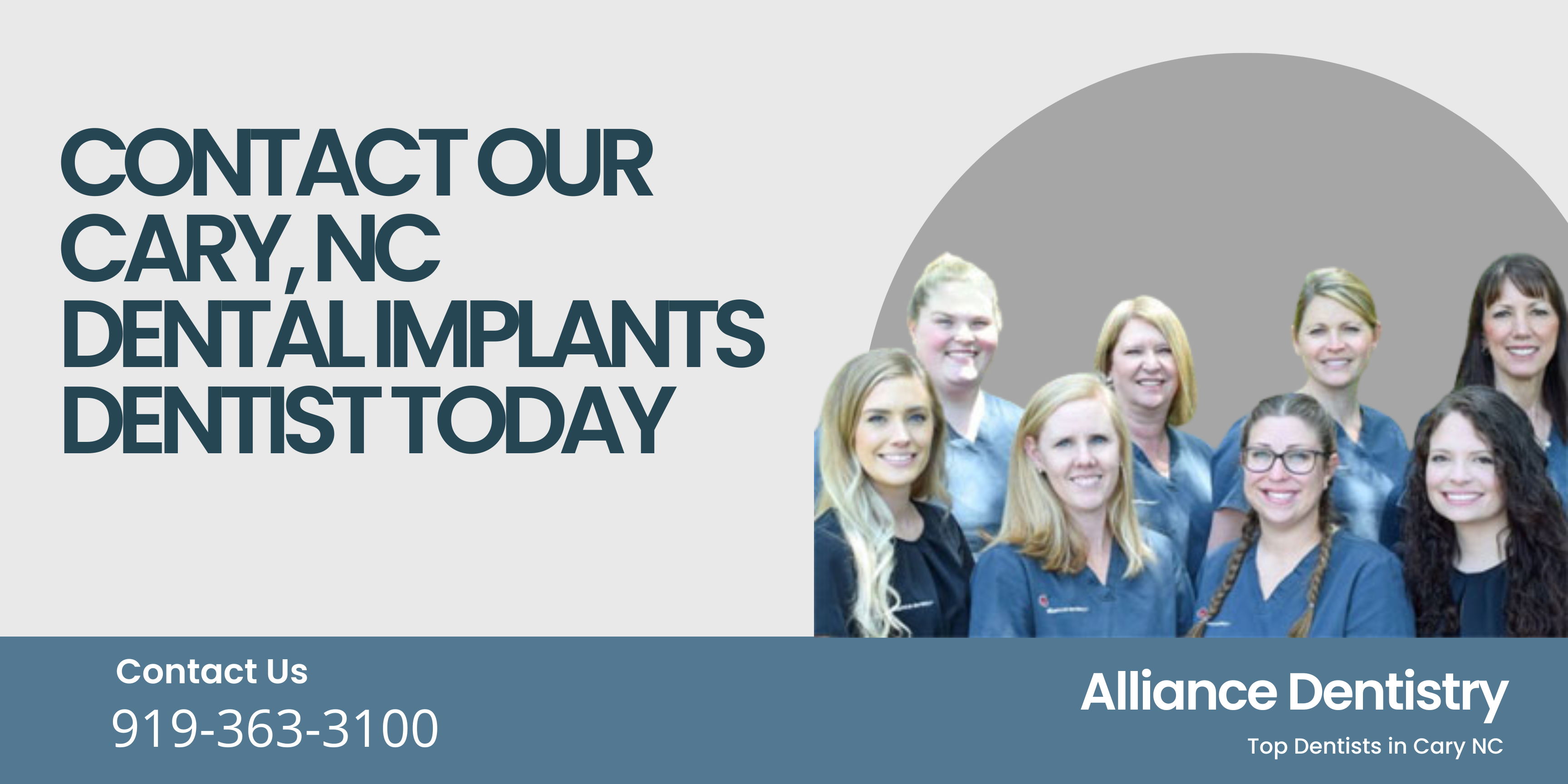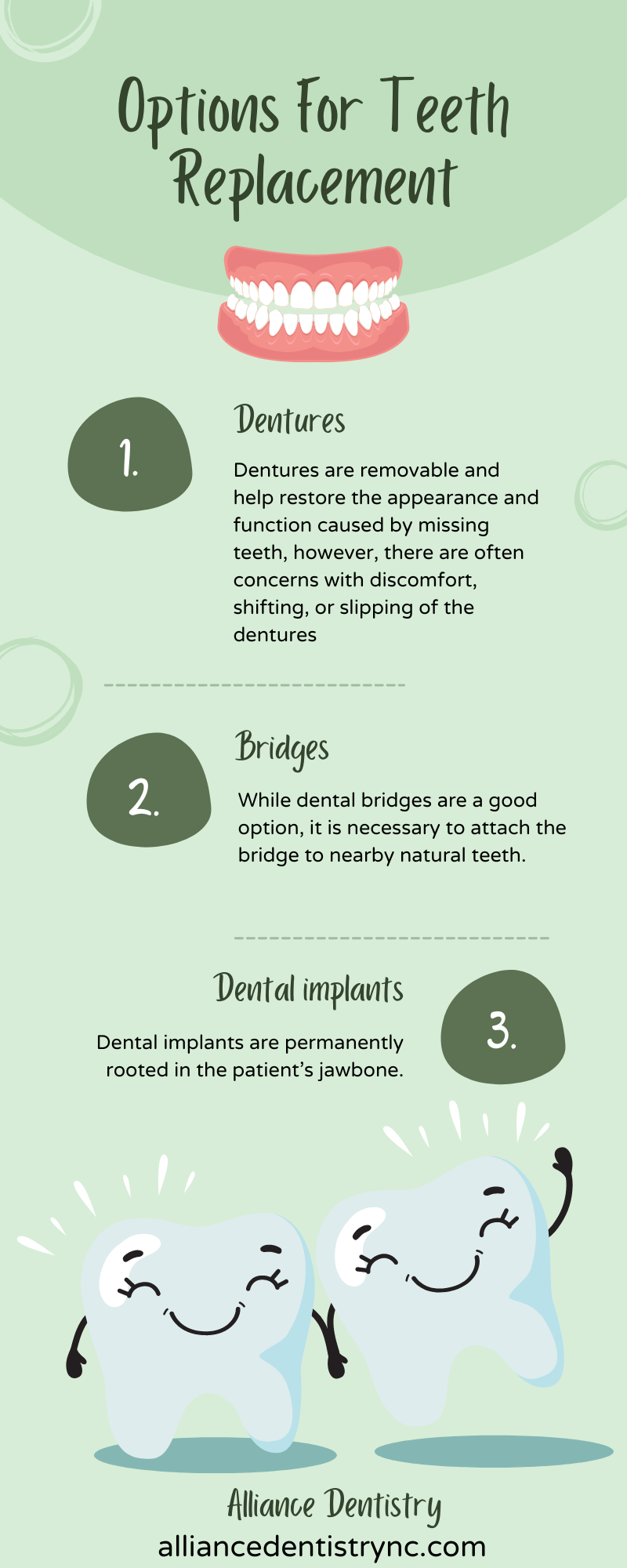Dental Implants Cary, NC
Dental Implants Cary, NC
Learn more about the best dental implants Cary, NC can offer!
If you’ve suffered tooth loss as a result of an accident, tooth decay, or gum disease (gingivitis and periodontitis), you should contact us at our Cary, North Carolina dentistry practice today. At our office, dental implants are a specialty. Cary NC dental implants lay the foundation for your replacement teeth, so if you are considering dentures or permanent tooth replacement procedures, you will most likely also need to consider implants. We pride ourselves on offering excellent dental implant procedures that will empower you to maintain a full and healthy-looking smile.
Obtaining a dental implant in Cary, NC requires surgery, and thankfully our dentists have years of experience performing dental implant procedures. If your insurance is accepted at our office, and if you have recently lost a tooth or fear that you will lose a tooth, you should schedule an appointment with Alliance Dentistry to discuss if dental implants in Cary, NC are an appropriate aspect of your treatment.
Dental Implants Cary, NC
- What Are Dental Implants?
- Why Would I Need Dental Implants?
- Dental implants provide a number of unique benefits, including
- What To Do If Your Tooth Gets Knocked Out
- Pick Up The Tooth By The Crown
- Rinse Off The Tooth and Store it Appropriately
- What To Do About A Loose Tooth
- What Are My Options?
- Replacing Missing Teeth
- What Options Are There for Teeth Replacement?
- Cary, NC Dental Implants Infographic
- Dental Implants: General Treatment Option Overview
- Kinds of Dental Implants
- Alliance Dentistry Cary, NC Dental Implants
- Cary, NC Dental Implants Google Review
- General Dental Implant Patient Recommendations
What Are Dental Implants?
Dental implants mimic the oral structures that hold your natural teeth in place. Titanium anchors are attached to your jawbone, and these anchors eventually fuse with the bone structure in your mouth. Once fused, you can undergo other cosmetic and restorative dental procedures while maintaining the appearance of naturally preserved and aesthetically pleasing dental health. With implants, your dentist literally lays the foundation for your replacement teeth. Here in Cary, NC dental implants are used to secure the following restorative dental procedures:
- Dental bridges
- Full dentures
- Partial dentures
Why Would I Need Dental Implants?
We recommend dental implant procedures to our patients if they are missing teeth or if they are experiencing a serious condition that will inevitably lead to tooth loss. If the roots of your teeth are infected, or if your teeth have already fallen out and you are seeking replacements, then you may need implants. If you recently lost a tooth and want a replacement, we may strongly suggest that you receive a dental implant as one of the first steps in your restorative treatment. Our Cary, NC dental implants are integral to securing many durable teeth replacement treatments, and at our dental office in Cary, NC, we will very possibly prescribe dental implant treatment if you are considering a replacement tooth procedure. Implants have helped thousands of patients effectively mitigate the adverse effects of their unfortunate oral circumstances.
 Dental implants provide a number of unique benefits, including:
Dental implants provide a number of unique benefits, including:
- Permanently improved appearance.
- Clearer speech – When dentures are inserted without an oral implant, your replacement teeth can move within your mouth, causing mumbling or slurred speech.
- Sturdiness – Once implanted, a dental implant becomes a durable part of your jaw and oral structure. Implants are remarkably durable, and if properly taken care of, they will be a permanent improvement to your oral health.
- Improved oral health – Your oral health will improve immensely with dental implants. If you lose a tooth and do not replace it, you put yourself at further risk to develop oral health issues like infections and gum disease.
What To Do If Your Tooth Gets Knocked Out
There are many situations that can arise that could result in a tooth getting knocked out. Some of the more common scenarios in which this could happen is due to a car accident, sports injury, slip, and fall, or another kind of personal injury accident. It is estimated that more than five million teeth get knocked out each year in the United States, so it’s certainly worth providing information to people about what to do if this happens to them. The two determining factors in whether your tooth can be saved are how you take care of the tooth after it gets knocked out and how soon you see a dentist.
If you or someone you know has had a tooth knocked out and are considering dental implants in Cary, NC, you must act quickly and take the following steps:
Pick Up The Tooth By The Crown
Never pick up a tooth that was recently knocked out by the root. Only handle the tooth by the crown surface when picking it up. The root contains periodontal ligaments (fibers) that are imperative for healing. If the tooth is handled by the root, our hands may accidentally remove some of these fibers. Additionally, by touching the root with our fingers it introduces more bacteria to the area.
Rinse Off The Tooth and Store it Appropriately
If the tooth is obviously soiled, rinse it briefly with tap water, but do not dry the tooth with power or scrub it. Do not wrap the tooth in a cloth or tissue, instead, place it in a plastic container with whole milk, saliva, or saline solution until you have arrived at the dental office. Milk is a great option for storing knocked-out teeth as it helps prevent the cells on the root surface from swelling up and bursting.
What To Do About A Loose Tooth
Perhaps your tooth didn’t get knocked out entirely but loosened within the gum socket. Your dentist can apply a splint to stabilize it until it can reattach. Your dentist may use a rigid dental material to bond over the enamel of the loose tooth and nearby teeth as the splint. It is important to see a dentist for a loose tooth because the tooth may need to be coaxed back into its proper positioning first. If it isn’t put back in place, it is possible it could fall out.
What Are My Options?
One of the most exciting things that can happen to a child is when a tooth falls out. It’s a celebration, complete with putting that tooth under the pillow, excitedly waiting for the tooth fairy’s visit, and finding money in place of the tooth in the morning. Losing a tooth as an adult, however, is never anything to celebrate. Not only can it affect how you look aesthetically, but a missing or knocked-out tooth can also have a negative impact on oral health. Read ahead to learn about dental implants Cary, NC residents trust.
Replacing Missing Teeth
If a person loses a tooth in the back of their mouth, where it really can’t be noticed, they may not be quick to seek out dental care as quickly as they do when the tooth was in the front and its absence is very noticeable. What they may not realize is both scenarios are just as important and can cause issues that go far beyond aesthetics.
The following are three important reasons why a person should consider dental implants in Cary, NC if they have any missing teeth:
- Dental implants will protect the remaining teeth. Every tooth has its own job to do and all teeth are meant to all work together when a person is chewing. A missing tooth can put serious stress on the other teeth because they are now doing more work than they were designed to do in order to compensate for the missing tooth. This can result in jaw pain, premature wear of teeth, and temporomandibular (TMJ) disorder.
- Dental implants will help keep your jawbone healthy. This is because the roots of the teeth stimulate the regeneration of a healthy jawbone. If a tooth and root are gone, the bone begins to deteriorate. This can eventually lead to the loss of other teeth in the area.
- Dental implants restore lost function. There are certain foods that you may not be able to chew properly, depending on which tooth is missing. This includes foods that are nutritious and necessary for good health.
What Options Are There for Teeth Replacement?
There are several options that our patients have when it comes to replacing a missing tooth or teeth:
- Dentures: Dentures are removable and help restore the appearance and function caused by missing teeth, however, there are often concerns with discomfort, shifting, or slipping of the dentures. Chewing is only improved by 10 percent. There are sometimes alterations to the patient’s speech. Dentures usually need to be relined every three to five years.
- Bridges: While dental bridges are a good option, it is necessary to attach the bridge to nearby natural teeth. This means these teeth have to be altered for the crowns that keep the bridge in place. Bridges usually need to be replaced every five to 15 years.
- Dental implants: Dental implants are permanently rooted in the patient’s jawbone. This means there is no slipping, discomfort, or damage done to other teeth. Chewing is improved by 90 percent. Implants are permanent and do not need to be replaced.
Another major difference between the above three options is that because dental implants are replacement roots, they stimulate healthy bone and tissue growth in the jaw. Neither dentures nor bridges offer that option. They are basically on esthetic solutions and only sit on top of the gum. This means that the jaw will gradually deteriorate.
Cary, NC Dental Implants Infographic
 Dental Implants: General Treatment Option Overview
Dental Implants: General Treatment Option Overview
Based on the needs of your specific oral condition and overall oral health, your dentist will work with you to develop a treatment strategy. Every dental implant candidate will require a different approach, although there are general treatment strategies that we will outline below to help patients build a basic understanding of the options.
Depending on your unique situation, your dentist may recommend one or more of the following treatment options as part of your overall dental implant treatment plan.
- Single Tooth – When you have lost a single tooth, usually one dental implant can be used to replace it.
- Multiple Teeth – If you have suffered from losing two or more teeth a multiple-tooth dental implant procedure may be a viable treatment option per dentist recommendation.
- Full Mouth – Some patients who have lost all of their teeth may be candidates for a full-mouth dental implant procedure. Full-mouth dental implants involve replacing every tooth that would be in your mouth with implants that are permanently rooted in your jawbone.
- Sinus Augmentation Procedures – Some dental implant patients may require sinus augmentation as a part of their dental implant treatment plan, specifically for upper back dental implant patients. Generally, the process involves procedures that help increase bone quantity and quality near the sinus to increase the likelihood of successful implantation. The quantity and quality of the bone where the implant is planned to be placed is key in the success of dental implant procedures.
- Ridge Modification – Again, the amount and quality of bone you have in the proximity of where the implant needs to be placed determines if dental implants are feasible. Certain patients may have deformities in the upper or lower jaw that can make dental implants more challenging. Generally, ridge modification involves removing gum tissue to expose the space where bone may be missing, and filling it with bone or an artificial bone substitute, in many cases greatly improving the likelihood of success.
Kinds of Dental Implants
There are two general categories of dental implants:
- Endosteal – The most common form of a dental implant. Endosteal refers to the dental implant being surgically placed directly into the jawbone. Endosteal implants may utilize a screw, cylinder, or blade that acts as a root for the dental implant to be secured to. This implant category is commonly recommended as an alternative for patients who currently wear dentures or dental bridges.
- Subperiosteal – This category of dental implant treatment involves surgically placing a metal framework on top of the jaw bone. The metal framework is designed to include metal posts that will protrude through the gum tissue, on which the implants will be secured. Generally, subperiosteal implants are recommended for patients without adequate bone height for an endosteal implant.
Dental Implants Glossary
Dental procedures, including teeth whitening and dental implants, are highly regulated to protect patients’ safety and ensure quality care. Below, we provide clear explanations of key legal and procedural terms relevant to dental services. This is especially helpful for those considering Cary, NC dental implants.
Practice Of Dentistry
The “practice of dentistry” refers to any procedure involving the diagnosis, treatment, or prevention of dental conditions. Many states classify services like teeth whitening as part of the practice of dentistry. This means that only licensed dental professionals are legally allowed to perform such procedures. For instance, in Missouri, offering teeth whitening services with products not commonly available over the counter is considered practicing dentistry. This regulation aims to maintain patient safety and ensure dental procedures are performed by qualified individuals.
State Dental Board Regulations
State dental boards are responsible for regulating dental practices within their jurisdictions. They enforce rules and regulations that govern procedures such as teeth whitening, dental cleanings, and dental implants. These boards can take legal action against unlicensed providers. For example, in North Carolina, the state dental board issued orders to prevent non-dentists from providing teeth whitening services. Such enforcement actions help maintain professional standards and protect patients from potentially unsafe practices.
Licensing Requirements
Licensing requirements vary across states, but they dictate who can legally perform certain dental procedures. Teeth whitening, for example, often requires a professional license. In some states, non-dentists can offer these services under strict conditions. In Illinois, non-dentists are permitted to provide teeth whitening as long as they disclose that they are not licensed dental professionals and adhere to specific guidelines. Licensing regulations are in place to ensure that providers are properly trained to perform safe and effective procedures.
Unlicensed Practice
The unlicensed practice of dentistry occurs when individuals offer dental-related services, like teeth whitening or dental implants, without the required credentials. This can result in significant legal consequences, including fines or injunctions. In Michigan, laws prohibit referral fees for dental services, including teeth whitening, to unlicensed individuals. Violations of these laws can lead to sanctions, emphasizing the importance of working with licensed dental professionals for all dental treatments.
Consumer Protection Laws
Consumer protection laws exist to shield individuals from misleading or unsafe practices. In dental services, these laws address deceptive advertising or the provision of unsafe treatments by unqualified providers. For instance, legal actions have been taken against companies that marketed teeth whitening products using deceptive claims. These laws ensure that patients receive honest information and high-quality care when seeking dental treatments.
For those considering dental implants or any dental services, working with trusted and licensed professionals is essential. At Alliance Dentistry, we prioritize patient safety and quality care in every treatment we provide.
If you’re ready to take the next step in improving your dental health, contact us today to learn more about your options for dental implants. We look forward to helping you achieve a healthy, confident smile.
Alliance Dentistry Cary, NC Dental Implants
202 Davis Grove Circle, Suite 102, Cary, NC 27519
Cary, NC Dental Implants Google Review
“Moved down here from the Chicago area and sought out a dentist and I can’t be more happier with this office. All the people are professional. The dentists are like your best friends and they sit and talk with you for as long as it takes and listen to all your questions and want to make the experience a positive one. You can’t go wrong with this office. Fantastic dental office.” – Doug S.
General Dental Implant Patient Recommendations
The needs of every patient are different, which is why it is important to work closely with your dentist. Ask plenty of questions to understand the various treatment options and their potential risks and advantages prior to committing to a plan. You will need to see your dentist within two hours of the tooth being knocked out, as the tooth can only remain outside the gum line for a certain period of time before it “dies”. Your dentist can insert the tooth back into the gum socket safely, and then you will have to monitor it to see if it has tightened back into place within a few days. If the tooth doesn’t adhere back into the gum socket, then your dentist can discuss with you your options for replacing the tooth with a fake one. To learn more about dental implants in Cary, NC, contact Alliance Dentistry today.



 Dental Implants: General Treatment Option Overview
Dental Implants: General Treatment Option Overview